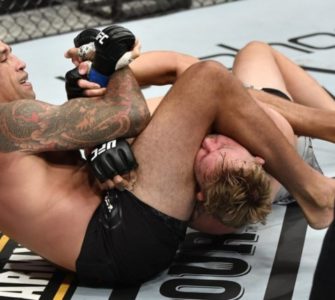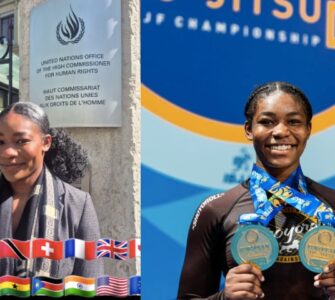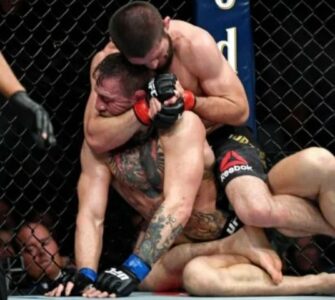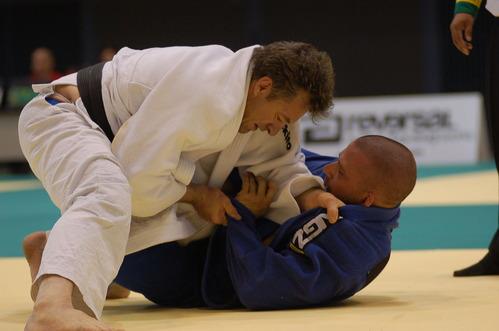
1.Hi Stephen, can you please introduce yourself to the BJJ Community of Eastern Europe?
Hi my name is Stephen Kamphuis, BJJ Black belt 2nd degree and 2nd degree Black belt in Judo. I started Judo at age 14 under Sensei Ivan Willis after seeing a demonstration at school and represented NZ in Judo the same year. I received my Judo Black belt at the age of 20 after coming 2nd in the young Adults at the Oceania championships. I moved to Australia at age 22 but it was difficult to train consistently and at the level required for International Judo due to the distance and my work schedule. I did make a big effort one year and won the Oceania Adult Judo Championships although I was actually training with the President of the Australian Judo Federation President Sensei John Peters art the time , I fought for New Zealand which was funny as I had to beat a couple of Australians to win.
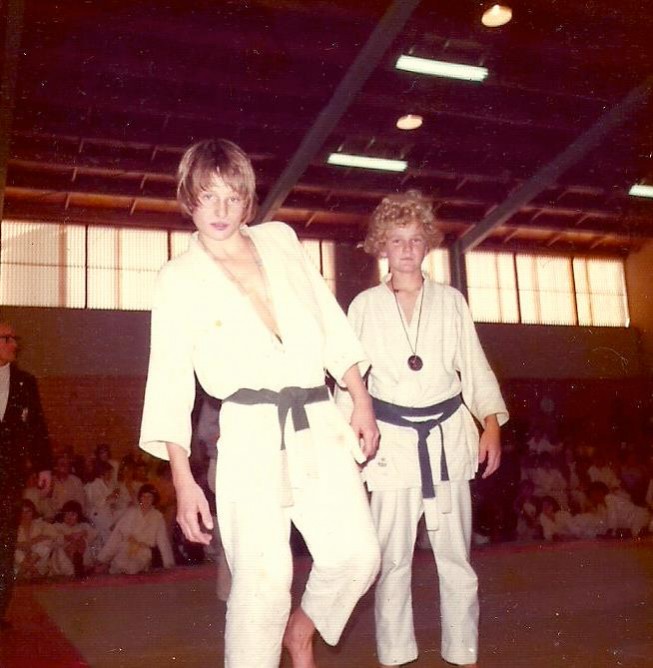
Stephen as a young Judoka
Sensei John retired and the Judo dojo closed, it was difficult to find one close by so would train Judo occasionally but also Boxing , Hapkido and doing alittle weight training on the side .Then a friend mentioned there was a Jiu jitsu school down the road I had never heard of BJJ I thought it was Japanese but on the first day I was sparing with former UFC fighter Elvis Sinosic and have hardly ever taken a day off training since
This was in 1997 I started BJJ at age 36 and feel so lucky to have stumbled into this gym under Machado Instructor Anthony Lange one of the first and best coaches in Australia.
In BJJ I have competed in just about ever major competition but my most valued wins are in the Damau in Japan the Pan Pacific in Australia and 3 times International Master /Senior Black belt Absolute champion. I was undefeated in Brazil in my division for 5 years. In Australia there where very few masters so I just competed with the adults in all the comps. I won most of the events in my belts.
I received my Black belt after 6.5 years of training due to winning the Absolute Brown belt division in 2004 in Brazil from both Anthony Lange and Black /Red belt Fabricio Martins.
2. What’s your Jiu-Jitsu story?Please tell us about your work as the president of the BJJ federation of the Philippines.
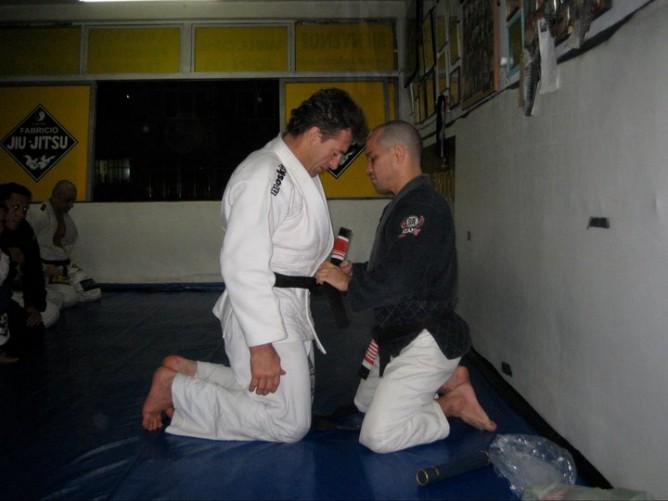
Stephen with his BJJ coach Fabricio Martins
I arrived in the Philippines in 2004 and I found it necessary to have organized comps if this sport was to grow.
I was not staying here at the time but decided to put up a comp and rented some mats, I remember we had about 100 competitors it was a great turnout and it was great the teams supported this comp.
From then on I realized that it was important that we create major events in the Philippines to give the local teams a chance to test them, expose the sport and improve the standard.
I also realized how difficult it was for local competitors to travel with the high costs and the visa requirements my goal was to make the Philippines the centre for the regions sport.
At this stage we now have the largest events outside of Japan and Australia in the Asia – Pacific region and the greatest number of parishioners.
I wanted the sport to be official and recognized by IBJJF and having met Carlinho Gracie few times I asked him if we could set up a Federation in the Philippines. We where granted the 1st official Federation in the South East Asian region. It is our job to promote the sport not only here but for all the teams in the region to provide a Competition venues and set standards for the sport.
IBJJF is doing a great job governing the sport and we try to emulate them in the Philippines creating a set standard and hosting organized events.
There is always room to improve but we have to keep pushing forward.
This is very important for the region if the competitors want to compete in the major international comps like the Worlds they need to test them selves and have a high level venue where they can compete locally.
3. Please tell us about your BJJ academies in the Philippines and about your relationship with the students.
We have two school locations based in Manila Philippines and about 10 affiliated schools some also in Manila and others in different regions.
Filipinos really embrace this sport and they take to it naturally developing great skills and techniques.
I like to see the development of children in the sport so we often add a specific children’s event at the major comps. Children are an important focus in the gym and I take most of the kid’s classes I enjoy the way they soak up the information they show such great dedication and skill it is a very enjoyable part of teaching, Perhaps as I also started as a kid I can relate to them.
As I am older than most of my students its like have a big family on the mat some are like nephews to me. I have known them when they where just at school.
I have trained in Judo or BJJ as a teenager, adult master and senior, I feel I can identify with all the students I enjoy training with the students and seeing their development both in the sport and in life. It’s great to see the changes BJJ brings to their lives and it is fun mixing with young people it keeps you young as well.
Your life revolves so much around the sport you end up knowing only three types of people, the ones that train Bjj the ones that live with someone training BJJ and the rest of the community.
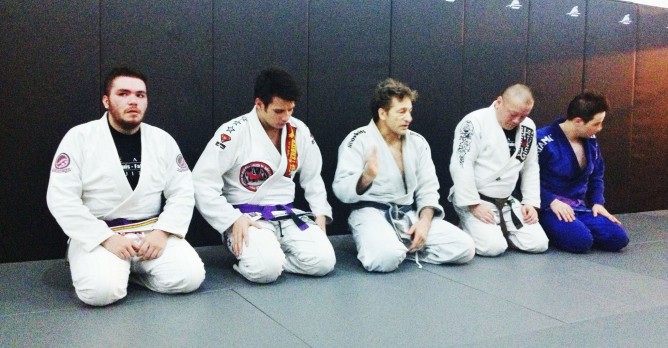
Stephen and some of his students in Manila
4. How would you compare the BJJ scene in The Philippines compared to the rest of Asia
It is growing here as time goes by the students have become instructors, new schools and teams have started to appear.
This is the natural process but this takes time in the last couple of years several new schools and gyms have opened and this will accelerate.
Last weekend we had a competition with around 350 competitors quite a few from overseas this just helps improve the level here , thereis a good healthy rivalry between the schools.
What also sets the Philippines apart from most of South East Asia it is that the locals here that make up the numbers. In most of the other regional countries the locals have been slower to get into the sport and a lot more expats are involved.
Its in the culture here Filipinos enjoy watching sports like boxing, UFC and with more exposure BJJ will grow immensely. The Philippines has 90 million or so people so there is a lot of potential for growth.
At the moment BJJ is mostly based in Manila but once it takes off in the provinces anything is possible. We are already starting to make comps in some of the regions and are starting to see quite a few entries now from these regions.
We have been very lucky the biggest group of shopping centers in PI is SM Super Malls who have been a big supporter of the sport, which means all our comps are held in shopping centers sometimes the audience, can top 10,000 per day. This is unique in Asia and the World.
5. Apart from Ralph Go, Eros Baluyot and May Masuda, do you see any other Filipinos possibly medalling at the Major IBJJF competitions in the future?
These guys have had great results and others such as Carlo Pena Noel Ang, Allan Drueco , and quite a few others have medaled in major events. Then there is Ram Aaanda who won both the Blue belt adults and purple belt masters last year who is half Filipino and was training here for a couple of years.
There are a lot of players here that also do very well in the regional events.
But the main impediment to achieving major International results is the travel costs and the visa requirements this holds back a lot of the players and the eventual results.
Very few can afford these costs, which is why we need to create major events here.
There are also good instructors here, guys that are really committed to their teams and to the sport.
6. You have competed at the highest level. What still pushes you nowadays to compete when many BJJ players at your age, have “retired” from competition and stick to just teaching.
I still have the drive and as long as the body is working I see this as the motivation to keep pushing your self to train stay hungry and in shape.
Maybe I did not have enough toys as a kid but I still like chasing medals. Since I started I have never missed a year of competition up to last year I was at every No Gi Worlds. The ADCC in the Philippines stopped me from joining last year.
I feel it helps me as a coach, I can identify with the students I can set the training and search for better ways , you want to continue to learn and work with the students.
The remarkable thing about the guys here they also love to compete , we would have around 70 – 80 % of the guys training attending the comps, I am sure the other gyms here are the same.
This alone is quite a motivating factor.
But I do understand if Instructors retire its quite an effort to compete as you get older, you have so many distractions in life and the body and mind have to be in the right place.

Stephen competing in Rio
7. What were your most memorable BJJ fights?
I have had quite a few, one with my team mate Anthony Perosh when I broke my thumb was a battle, George Siroppolus in the Purple belt finals in the Pan Pacific I lost by reffs decision and when I broke my ankle at the No Gi worlds then six months later I won the Black belt absolute in Brazil that took some will power to overcome and fight again, I just had the plates out.
Then there is Professor Cunha in Japan we had some great matches.
But the one that stands out is for me is with Helvicio Pena we fought in the Black belt senior Absolute it was a very controversial fight I lost by a penalty even though I was the one who scored all the points. The next year they put us in the centre mat with three raffs and I could not finish an arm bar he won by an advantage it was a great match and we both agreed that 5 minutes is not enough for us we want to do 10 minutes together see who falls apart first.
He’s a great fighter I respect him a lot.
8. Please tell us about your relationship with Fabricio Martins your instructor.
I met Fabricio when Anthony and I went to Brazil to compete in 2003 we where recommended to his school by a friend and training partner Raphael Costello. Since then I competed and trained at his school seven times while staying in Brazil.
You can never underestimate the influence a good instructor can have on a student not only on his game but also the character and the mutual respect that is created. I was just very lucky to have come across both my Instructors. Fabricio is possibly the youngest Red /Black belt in the World at only 47.
He is a genius on the mat, new and many impressionable students are often so eager to get the latest champion to do a seminar or look up you tube to see the latest / greatest techniques.
For me there are only two types of techniques the ones that work and the ones that don’t.
Fabricio has had years of competing, training and teaching, coaching and even earning from his own students some World champions, Brazilian champions etc. He started BJJ at age 5 under 9th degree Grandmaster Osvaldo when you mix this knowledge together you get an awesome teacher with so much experience.
If you ever attend one of his seminars they are amazing.
Fabricio is like a brother to me but I respect him as my master.
I am greatly indebted to both my instructors Fabrico Martins and Anthony Lange and very grateful to be their student.
9. What is next for you and your team in 2013?
We just opened a new gym with more space to train. I just see the guys improving, as they start moving up the belts and bringing up the level of the new students with them
It takes quite a few years to build a core base we are just at that time now where the guys are moving up the ranks , in the next couple of years we will see our first Black belt and a few Brown belts coming through.
This is when you start to see students improve as the guys also play a big part in the team and student development.
For me personally besides playing my part to develop the students , keep them honest on the mat and run the gym . I have two BJJ goals one is to continue competiting in at least a couple of comps a year and work hard to develop the BJJ comps for PI and the region and work with IBJJF to get recognition for the region so in the long term when we get the numbers we can host an IBJJF event.
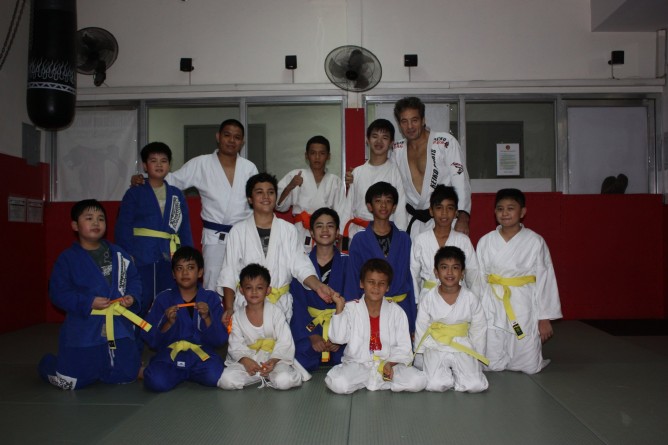
With some of junior students
10. If you want to thank somebody or sponsors, feel free
Thank you for allowing me to talk about the BJJ scene here in the Philippines and share some experiences.
I would like to thank all my students and my Instructors Anthony Lange and Fabricio Martins and thank all my past / present training partners, my advice to anyone who wants to have longevity in the sport find a supportive wife / girlfriend and do a lot of stretching . www.bjjphilippines.com
11. Thanks Stephen and all the best!
Thank you!


